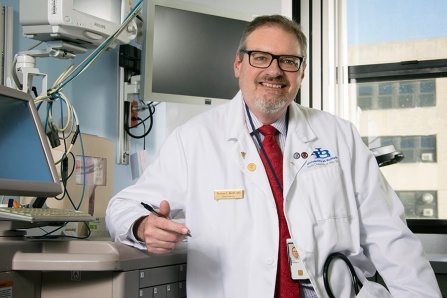Message from the Program Director

Fellowship program director Thomas C. Mahl, MD.
Rigorous rotations, specialized training tracks, supportive faculty and state-of-the-art training facilities set you up for a rewarding future in the field of gastroenterology, hepatology and nutrition.
Comprehensive Training
Our rotations enhance your ability to diagnose and manage a wide variety of gastroenterological diseases. You’ll care for patients with conditions including hepatitis, cholestatic syndromes and vascular and motor disorders of the gastrointestinal tract. You’ll learn about procedures ranging from endoscopic ultrasound to gastric, pancreatic and biliary secretory tests.
I am confident our electives will provide you with rich, supplementary learning opportunities as you gain experience in diverse settings in Western New York, across the country or abroad.
Our didactics — including grand rounds, our research seminars and journal club — will complement your hands-on experiences and strengthen your knowledge about recent advances in gastroenterological care.
We offer unique training that prepares you to embark on research. Our Introduction to Biomedical Research course acquaints you with strategies for planning, implementing and publishing biomedical research.
Individualized Program Tracks
Education in our fellowship is tailored to your unique needs. We offer two paths of study: a research track and clinical track.
Fellows on our research track find that they feel prepared to embark on careers at competitive research universities after completing our program. You’ll have an assortment of potential research opportunities with forward-thinking, oft-published faculty.
Our clinical track equips you with additional advanced procedures rotations and electives, preparing you for a successful career dedicated to patient care.
Knowledgeable Mentors
Our division has a favorable student-to-faculty ratio, which means you’ll receive personalized training from dedicated faculty members.
In our program, you’ll work with instructors who are committed to developing your professionalism and competence within a nurturing, gratifying learning environment.
Diverse Training Settings
Training in our system of affiliated clinical sites, you’ll work in settings including an urban hospital, a hospital for veterans and private offices.
Whether you’re conducting research in one of our cutting-edge labs or providing care in outpatient and inpatient settings, your time in our program will take place in diverse environments that help you build a solid foundation of knowledge and experience.
Take a look around our website, and feel free to contact me with questions.
Best regards,
Thomas C. Mahl, MD
Program Director




